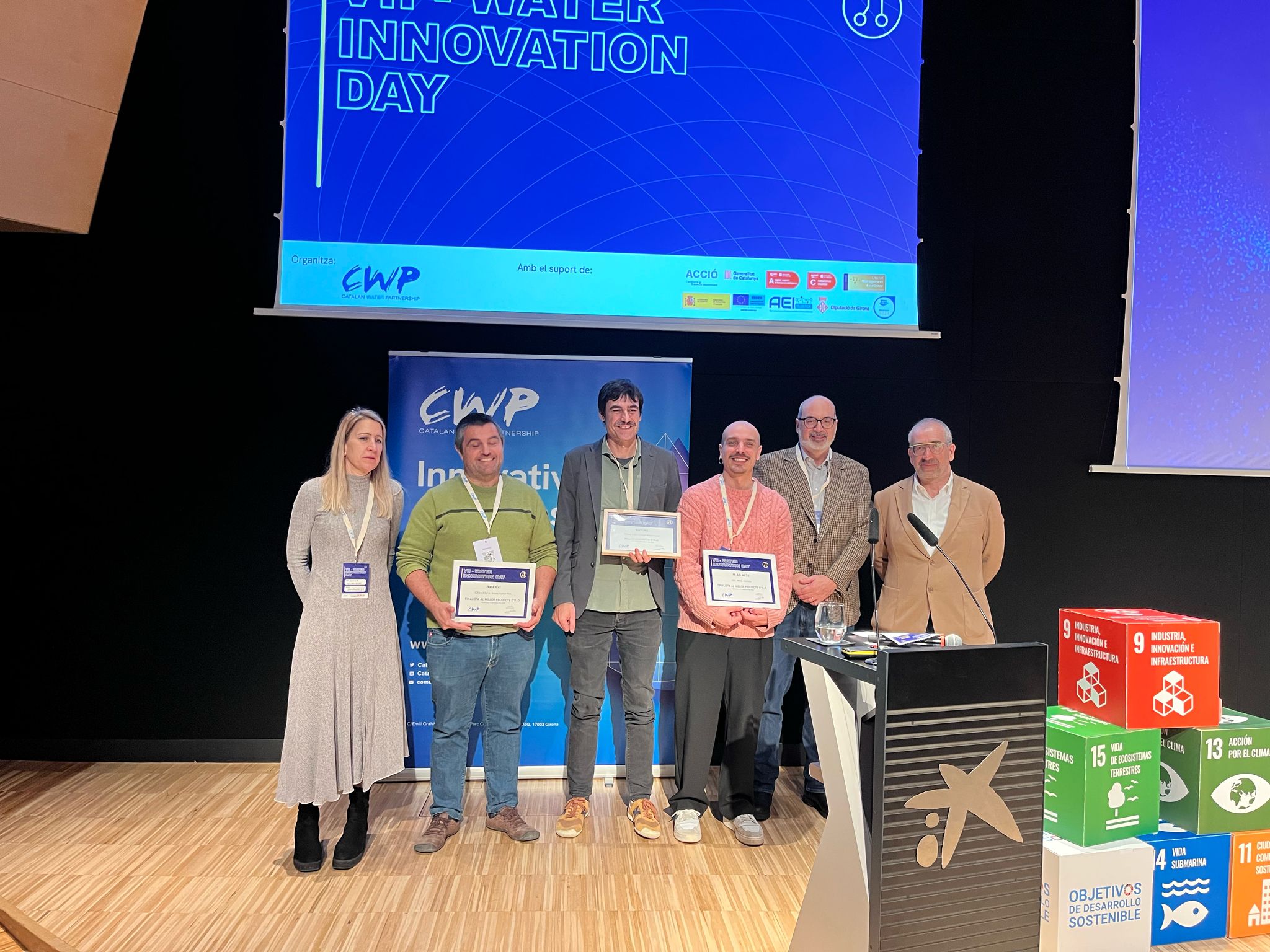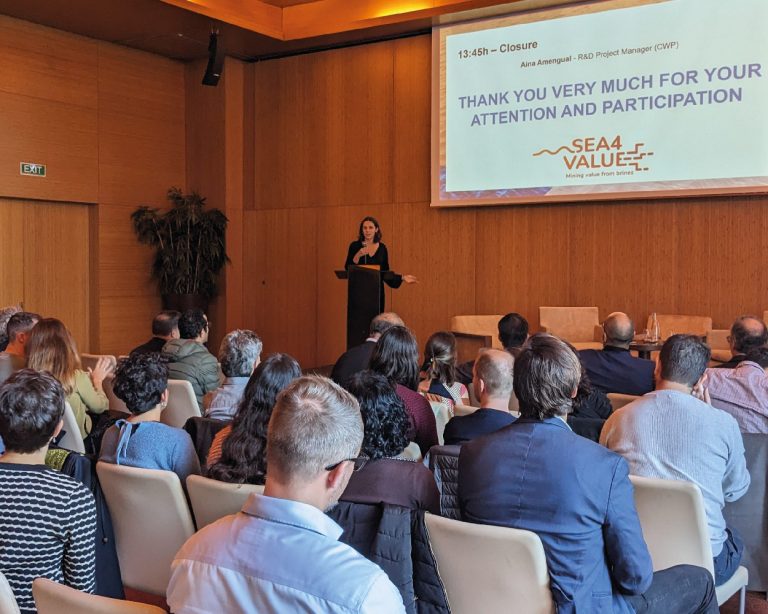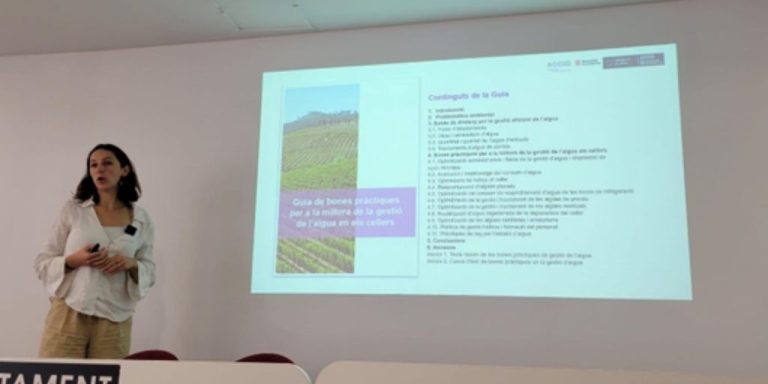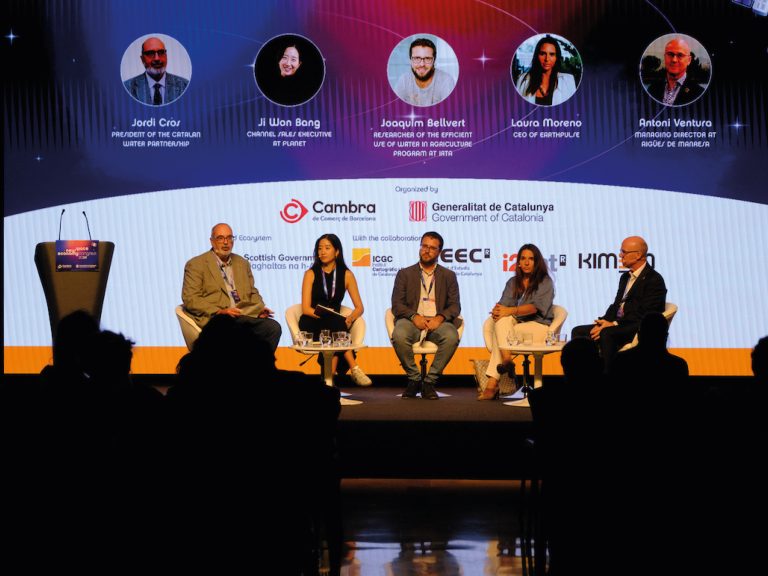VII Water Innovation Day, promoting technological innovation in the water sector
- The winning project of this year’s edition was the NATURE project presented by Víctor Matamoros from Idaea – CSIC
- The finalist projects were Nat4Wat from ICRA presented by Josep Pueyo-Ros and M-AD-NESS from IQS Barcelona presented by Yeray Asensio
On 20 February, the Auditorium of the CosmoCaixa Science Museum hosted the seventh edition of Water Innovation Day, an event organised by the Catalan Water Partnership (CWP) aimed at promoting the transfer of knowledge and results of the main R+D projects carried out by companies and research centres in the water sector in Catalonia. The event was attended by more than 160 attendees and the presentation of 15 R+D projects, consolidating itself as a key event for professionals in the sector.
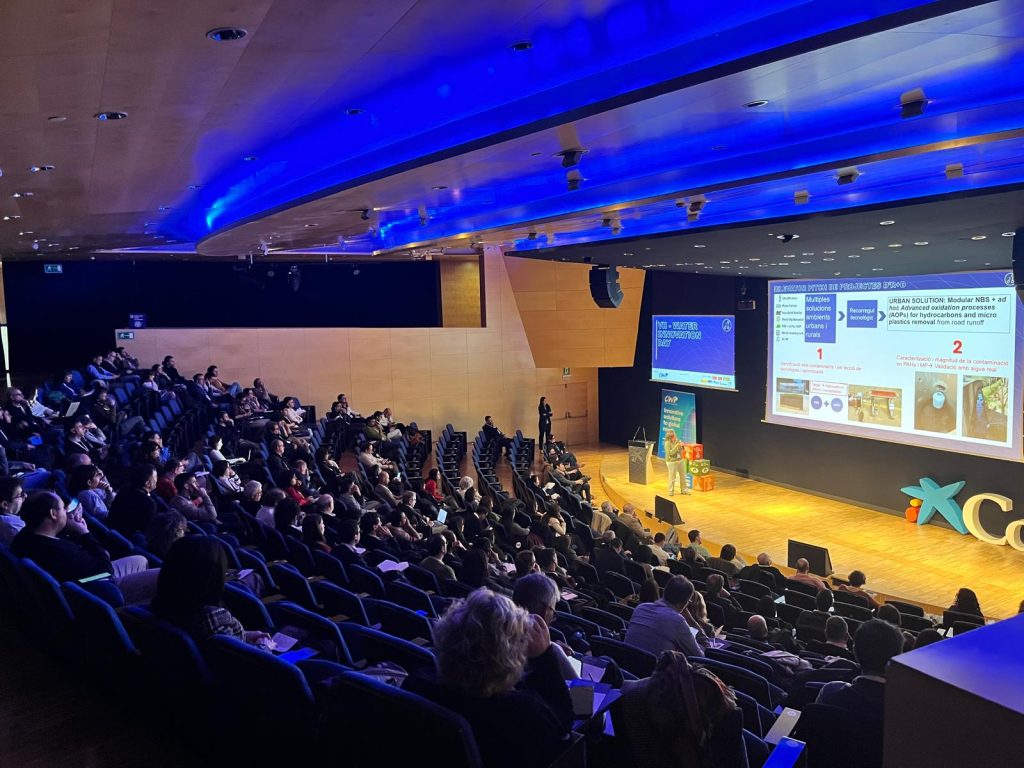
Betting on collaboration and innovation
One of the missions of the water cluster is to promote collaboration between companies, technology centres and institutions, and in this way to address the current challenges of the water sector with greater guarantees of success. This was remarked Jordi Cros Herrero, president of the CWP, in welcoming the attendees, in addition to highlighting the 28 R+D and innovation projects in which the CWP has participated or coordinated during 2024, ten of which with European funding, or the AEI grant program of the Ministerio de Industria y Turismo and IRC programs ACCIÓ. The cluster manager, Xavier Amores, also advanced information about future conferences and fairs where the cluster will have an active presence.
Innovation and research and development opportunities were also the focus of the intervention of María José Tomás, from the Department of Industrial Promotion and Territorial Cooperation of the CDTI, who presented the lines of support for R+D+i of the CDTI focused on the water sector, as well as a general overview of European calls and other collaboration initiatives.
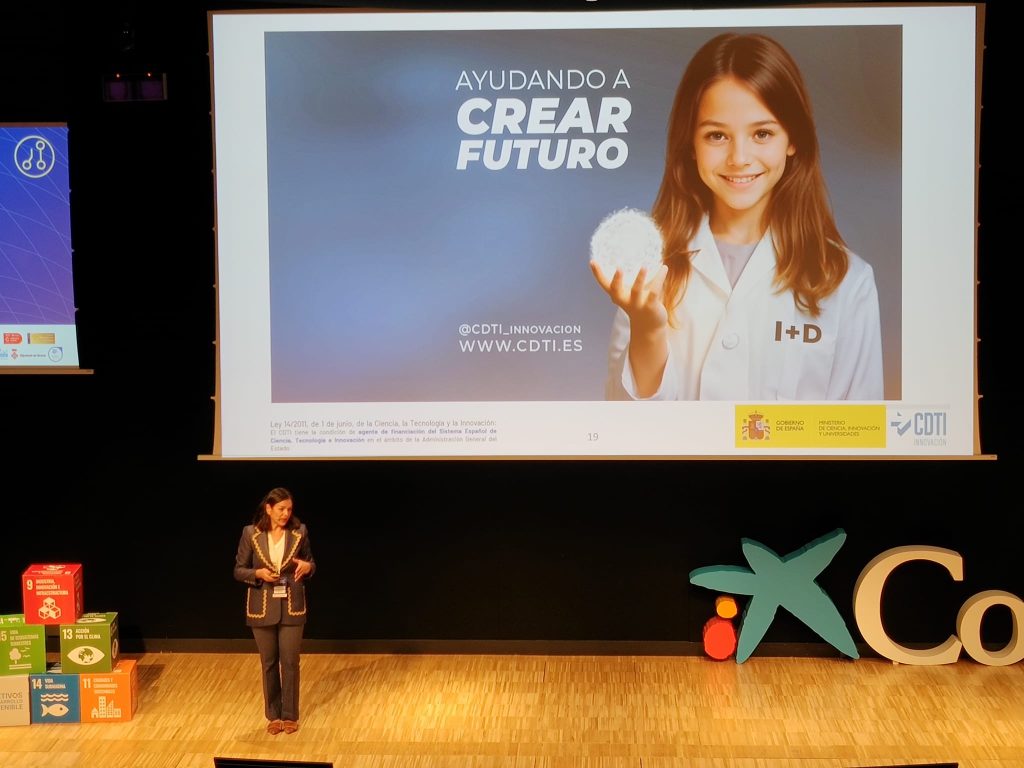
Presentation of R+D projects for sustainable water management
One of the central moments of the day was the block of presentations of R+D projects, in which fifteen projects were presented that address various challenges in water management and treatment. The resilience of water treatment plants in the face of climate extremes and their adaptation through digitalisation were the focus of initiatives such as Impetus (Eurecat), presented by Queralt Plana, which focuses especially on the prevention of algae blooms, and AquaDapT (Aigües de Vic), by Anna Treserra, who uses digital tools to guarantee the quality of drinking water. Nature-based solutions were the protagonists with Nat4Wat (ICRA-CERCA), presented by Josep Pueyo-Ros; NATURE (IDAEA-CSIC), which scientifically evaluates its potential to eliminate antibiotics and antibiotic resistance genes, as explained by Victor Matamoros; and Nature (Besòs Tordera Consortium), which is committed to the regeneration of water with artificial wetlands, presented by Sandra Valero. In the field of reuse and recovery of resources, LIFE WARRIOR (Cetaqua), presented by Pau Berenguer, develops an innovative scheme to guarantee reclaimed water in agricultural irrigation; Life-ZOO (LEQUIA – University of Girona), where Paola Sepúlveda presented strategies for circular water management in zoos, while IntelWATT (Sorigué), presented by Eudald Tuxans, focuses on industrial symbiosis to take advantage of water and energy resources. The circular economy was also represented by ICARUS (ACCIONA), by Aina Soler, who recovers cellulose from WWTPs for construction, and FOSPHORUS (Genocov – Autonomous University of Barcelona[XA6] ), where Juan Antonio Baeza presented strategies for recovering phosphorus in wastewater treatment. The use of by-products was also the focus of M-AD-NESS (IQS Barcelona), presented by Yeray Asensio. Technological innovation applied to water quality was reflected in technology ELSAR® (Aqualia), developed within the framework of the ULTIMATE, presented by Patricia Zamora, which combines electrostimulation and biological treatment; The project NYMPH (LEITAT), where Ainhoa Gaudes detailed strategies to protect groundwater and prevent pollution; and RegAssist (IRTA), explained by Jordi Oliver, who seeks to optimize agricultural irrigation through digital technologies. Finally, the protection of ecosystems and sustainable water management were the focus of REST-COAST (We glimpse), presented by Laura Puértolas, in which business plans for nature-based solutions for the restoration of coastal ecosystems have been developed.), presented by Laura Puértolas, which offers tools to protect and restore coastal ecosystems.
One of the novelties of this edition was the Technical Conference on Cybersecurity applied to the urban water cycle, a session in collaboration with the INCIBE Chair in Digitalisation and Water Cybersecurity at the University of Girona. In it, Manel Poch, professor of chemical engineering at the University of Girona (UdG) presented the chair and Manel Medina, director of the master’s degree in cybersecurity management and professor at the Polytechnic University of Catalonia (UPC), gave a presentation highlighting the importance of cybersecurity in the water sector.
Awards for the best innovation projects
The attendees chose the best research project in the sustainable use of water, an award that went to NATURE of the IDAEA – CSIC presented by Víctor Matamoros. NATURE is a project that was funded within the framework of the 2020 AquaticPollutants joint call. The NATURE project, carried out between 2020 and 2024, aimed to demonstrate, through scientific evidence, that nature-based solutions can improve water treatment at the scale of a river basin. These solutions reduce pollutants in aquatic ecosystems and attenuate the ecotoxicological effects derived from anthropogenic pollution. For the first time, a comprehensive evaluation of several natural techniques, both conventional and innovative, is carried out to minimize the impact of antibiotics, antimicrobial resistance and pathogens on water quality. The project has been divided into three phases: experimental phase, in which the reduction of aquatic pollutants in nature-based solutions has been evaluated and the results have been compared with conventional technologies; secondly, the data have been modelled and finally a risk assessment on human health has been carried out. The project, coordinated by IDAEA-CSIC, has been carried out together with the University of Aarhus (Dinamàrca), CIIMAR (Portugal), KIT (Germany), Kilian Water (Dinamàrca) and ENI-ABT (Mali).
The two finalist projects were Nat4Wat from ICRA presented by Josep Pueyo-Ros, and M-AD-NESS from IQS Barcelona presented by Yeray Asensio. Nat4Wat is a decision-making support tool developed within the framework of the European Multisource project that assists the user in selecting the most appropriate nature-based solution for their needs depending on the application case and needs in relation to water management. M-AD-NESS is a project funded by the State Research Agency that aims to create a new technological solution based on the integration of biological and bioelectrochemical processes for the revaluation of WWTP sludge through dual anaerobic reactors that allow the production of biomethane in-situ.
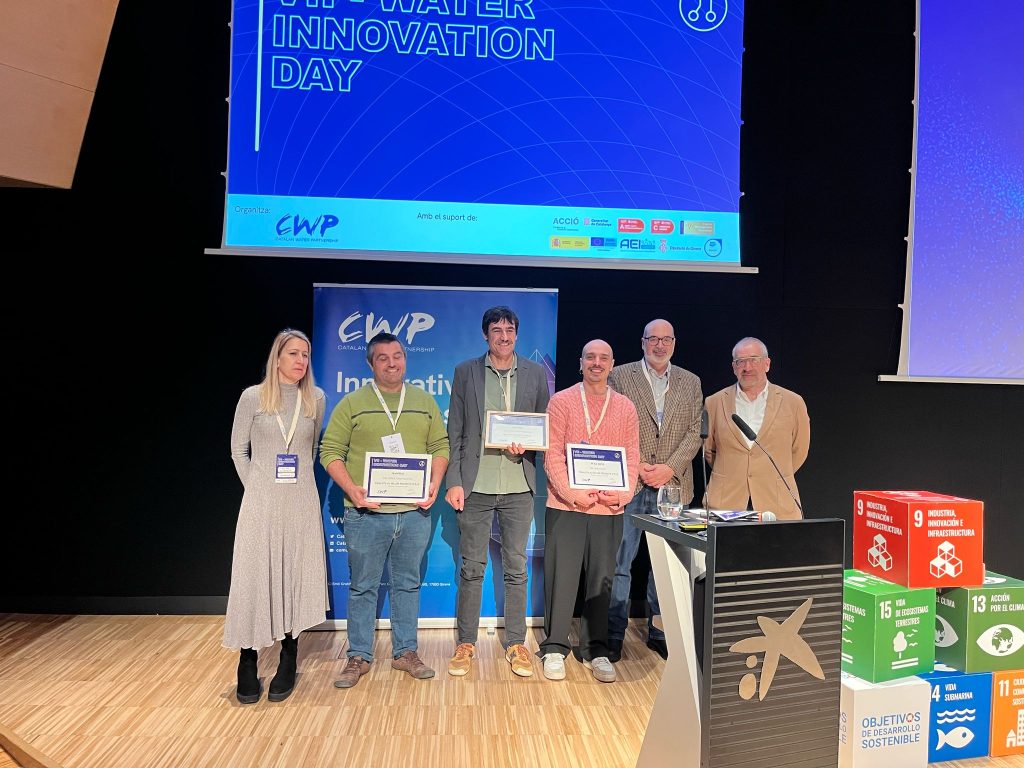
Institutional closure
Javier Selva, Director General of Knowledge Transfer and Society of the Government of Catalonia, closed the day by underlining the relevance of these meetings to promote technology transfer in the water sector and the role of clusters such as the CWP in connecting scientific and technical supply and demand.
With this seventh edition of Water Innovation Day, the CWP reaffirms its commitment to innovation and collaboration in sustainable water management.
